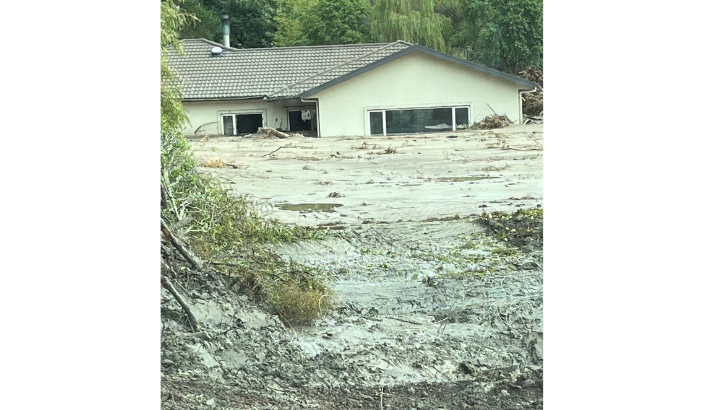The worst adverse weather event in our history?

Photo: Supplied.
TERRY COPELAND
There is no doubt in my mind that this adverse event and national state of emergency is among the very worst this country has ever experienced (if not the worst).
The scale across nine provinces, the impacts of electricity and telecommunications disruption – with many properties still reliant on generators and many roads and bridges wiped out, means it will be a long time to bring normality back to many people’s lives.
It was harrowing meeting and listening to people describe the damage, the sick feeling of how close they were to losing people and the very real frustrations of seeming inaction by the authorities.
What is remarkable is that the loss of life was restricted to less than a dozen (at this stage).
The Esk River rose from its normal 9 metre height to 18 metres in a matter of hours in the middle of the night.
That sheer volume of extra water, beyond comprehension; as one scientist said, an extra 72 Olympic size swimming pools of water flowing through Esk Valley every minute…
Every new shower brought back memories of the worst night of their lives.
We met farmers in Otane (Central Hawkes Bay). I asked one how his place was affected. He explained that of his 740-ha property, all but 20 hectares was still under water 10 days after the Cyclone hit.
Fortunately, his house and main implement shed were spared but there was nowhere for the water to drain.
He was more concerned about the damage to some of his neighbours who were dealing with animals cut off in inaccessible paddocks, local roading and what impact further rain would have.
The sense of community amongst farmers and growers was heart-warming.
Their pragmatic, ‘roll up your sleeves’ and get stuff done approach, such a useful way to cope.
Later that same day visiting another group of farmers in the Glengarry and Rissington areas, we learned of a family who’d donated land for a community hall and camping ground, in memory of soldiers lost in the two World Wars had already set up a fundraising page to save those community assets despite significant damage to their own property.
We picked up Associate Primary Industries Minister Hon Meka Whaitiri to see first-hand and listen to their stories and concerns.
We all went to the Rissington Bridge (or rather where it had been) and saw how locals had been able to string up a flying fox to get food, medicines and fuel across the river.
Forestry slash on Hawke’s Bay beaches is an ongoing issue. However, it’s not only slash causing damage.
The bridge at Rissington was swept away due to the riparian plantings along the river- banks.
Weeds on riverbanks have grown significantly since waterways were fenced off from grazing stock.
Rivers broke banks and spread out because of shingle build up. We saw exactly these factors behind the Canterbury flooding in 2020.
They are another challenge we need to learn and act on.
Another issue is the lack of a ‘Civil Defence radio’ and information about who was cut off, and where.
Another was the situation of the military grounding private helicopter companies from making crucial food and medicine drops to clear skies for themselves.
Why didn’t they simply bring these helicopters and pilots under their command and cover a greater area much more quickly?
Why hasn’t there been a survey done to understand the needs and situation across the dozens of small and not so small communities across the North Island in a methodical and consistent fashion?
Federated Farmers will be vocal about utilising the army to be on the ground to both deter ‘disaster tourists’ and the criminal element.
A visible presence was needed to providing safety and comfort to locals. The police in the main have done a very good job, but simply cannot be across the number of smaller isolated areas.
The army fulfilled this function admirably after the Christchurch earthquake.
The vulnerability of the electricity network for the East Coast needs to be addressed.
For years it was presumed the weak link across the network was pylons crossing individual farms, when it was the positioning of the substation for the Hawke’s Bay which caused the biggest weakness to the system, causing a grid emergency.
I will be visiting the Gisborne area in a couple of weeks to try and understand the concerns and issues they have and to support our people.
Every area will have a different set of challenges and issues to deal with.
By then, we will have launched the Farmy Army, which will make an enormous impact to help the hundreds of farmers get back on their feet.
